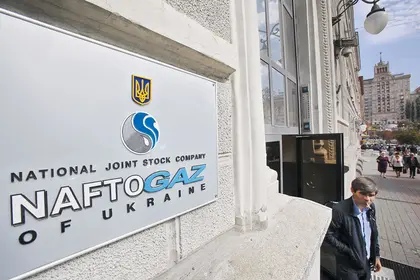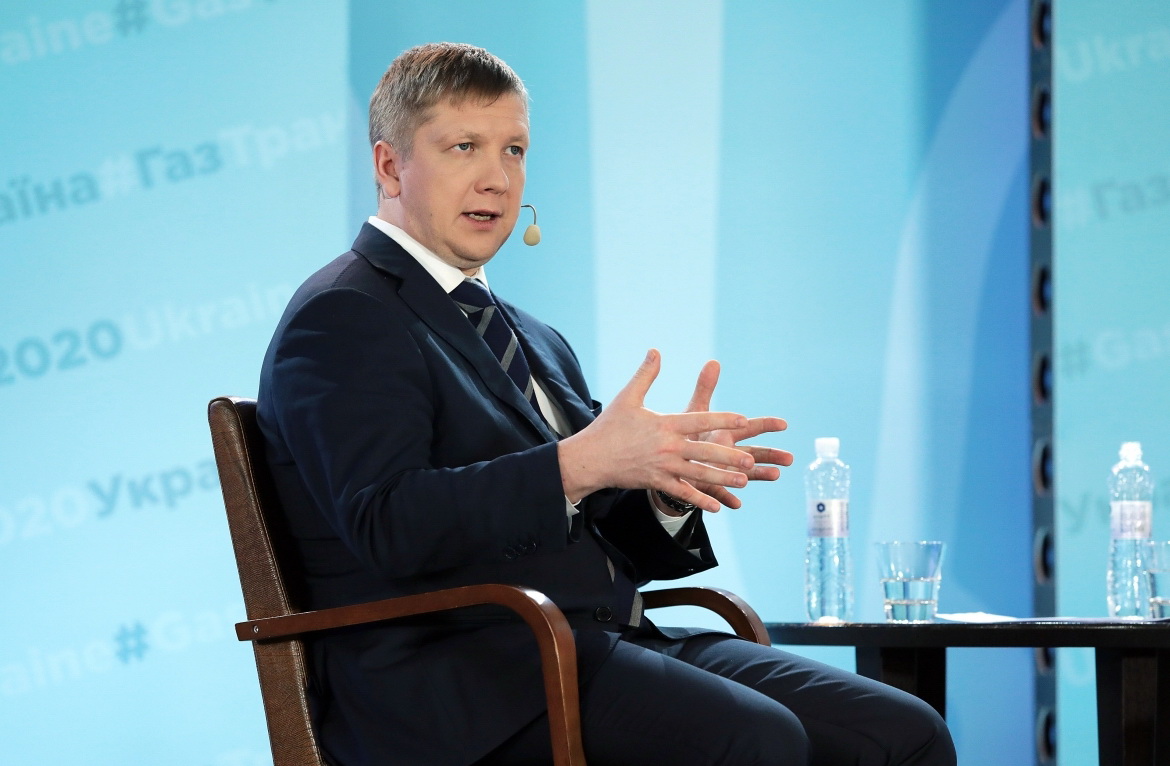Ukraine’s state oil and gas giant Naftogaz, the country’s biggest taxpayer, is “facing sabotage.”
Amos Hochstein, a U.S. businessman and former diplomat who had been an independent director on the company’s supervisory board since 2017, used these words when he resigned on Oct. 12.
JOIN US ON TELEGRAM
Follow our coverage of the war on the @Kyivpost_official.
Hochstein slammed a “sordid” memorandum with “unworthy and questionable” U.S. company Louisiana Natural Gas Exports to supply liquefied natural gas to Ukraine and voiced his support for Naftogaz CEO Andriy Kobolyev, who was recently accused of embezzlement.
- Read the newest war in ukraine update in the Kyiv Post’s daily news coverage for today.
- Receive the latest Ukraine news bulletins for today.
The charges came out of a government audit, which alleged that the company committed $6.5 billion worth of violations and already underpaid $2.8 billion to the government.
“I can no longer stand by and be used to endorse this negative trend, and it’s why I must voluntarily leave the board,” wrote Hochstein in his column for the Kyiv Post.
Hochstein’s resignation itself is a bad sign for Naftogaz, but not as bad as the underlying causes.
His departure could mean the end of an entire “era of the formation of an independent gas market in Ukraine,” according to Andriy Favorov, who until recently had headed the integrated gas business at UkrGasVydobuvannya, a subsidiary of Naftogaz.
“The situation looks very bad,” said Oleksandr Kharchenko, director of the Energy Industry Research center. “Hochstein marked a very dangerous issue.”
Everything that is currently happening at Naftogaz could be caused by political pressure, as well as the desire of influential business people and oligarchs to bring back the old times, when Naftogaz was an opaque company.
Favorov named Hochstein as one of those who made it possible to “clean up the big (shady) schemes, and open Ukraine to the European gas market,” as well as to make the state behemoth independent from the “mood of one person sitting in the Kremlin.”
In 2015, after Russia started its war in the Donbas and annexed Crimea, Hochstein, then U.S. chief energy diplomat, helped Ukraine receive reversed natural gas from Slovakia, despite Russia’s attempts to block this process.
Favorov described Hochstein as a “world-class professional in the oil and gas industry,” who deeply understands the global geopolitical and commercial processes of the gas market. He “gave confidence to both international and domestic investors that the company was managed in accordance with the best corporate principles,” Favorov said.
Now, after his resignation, the public will question not only Naftogaz, but other large state companies, about the “level of political influence” on their management activities.
Suspicious audit
On Oct. 6, Naftogaz turned into one of the largest debtors in Ukraine.
After an audit, the State Audit Committee announced that Naftogaz had committed tax violations and greatly understated its income and the amount of money it paid in dividends. These were multi-billion-dollar debts.
Naftogaz’s management denied any wrongdoing and said the State Audit Service did not provide any facts to prove its allegations. Naftogaz’s accounting complies with the law, the company said.
“The State Audit Service did not reveal any factual damages to the property rights of either the company or the state,” the press service of Naftogaz told the Kyiv Post in a message.
Several experts believe that people might be deliberately attacking Naftogaz CEO Andriy Kobolyev and said the audit was unprofessional.
“I’m very skeptical about this audit,” said Kharchenko. “The report wasn’t done in a professional way. In my perception, it’s like a political tool to pressure Naftogaz’s management.”
Favorov is also on Naftogaz’s side. He is sure that the quality of the state audit is very low, especially given that the state company was regularly audited by reliable international first from the Big Four — Deloittе and KPMG.
“Do not make me laugh. Obviously, this is either a lack of understanding of the essence of the issue or it is a political order,” he said.
Kharchenko believes that the people who initiated this audit may have plans to attack Kobolyev and the Naftogaz management personally, not thinking about the consequences these actions may have for Ukraine.
“They can’t even estimate how dangerous and how bad this is for Ukraine’s image,” said Kharchenko.
The experts believe that someone wants to remove Kobolyev from the company or at least discredit him due to rumors that he could be a successor to Prime Minister Denys Shmyhal should President Volodymyr Zelensky decide to replace the head of the government.
“These have been the most serious claims against (Kobolyev’s) work” since his appointment in March 2014, said Hennady Kobal, analyst at energy industry think tank Expro.
Kobal added that Naftogaz needs support now more than ever — Hochstein’s departure is sending a bad signal, which some see as his attempt to flee from responsibilities he had at Naftogaz.
“It’s very bad when a company is accused (of wrongdoing) and a supervisory board member leaves, because it sounds like the member doesn’t want to bear responsibility for these accusations,” he said.

Meanwhile, Favorov doubts that there is a direct link between Hochstein’s departure and the company’s audit.
He rather looks at Hochstein’s decision to leave Naftogaz as his way to prepare to return to American politics. Hochstein is a close ally of former U.S. Vice President Joe Biden, the Democratic Party’s candidate in the 2020 U.S. presidential elections. If Biden wins and Hochstein is appointed to a top post in the U.S. Department of Energy, Favorov wouldn’t be surprised.
Biden has already played — albeit, unwittingly — a central role in Ukrainian domestic politics. His son Hunter served on the board of directors of private energy company Burisma. During an infamous July 25, 2019 phone call, U.S. President Donald Trump pressured Zelensky to investigate Biden over his son’s work for the company.
Just two hours after the call, Trump’s administration ordered the Pentagon to freeze almost $400 million in military aid to Ukraine. That action — deemed a “quid pro quo” by many — would later lead to Trump’s impeachment by the U.S. House of Representatives.
On Feb. 5, the U.S. Senate found Trump not guilty of high crimes and misdemeanors.
Deal or no deal?
The memorandum signed between the little-known American company Louisiana Natural Gas Exports (LNGE) and Ukraine’s government on May 27, as well as the appointment of Robert Bensh — a figure controversial among energy experts — to the supervisory board of Naftogaz in March, were among Hochstein’s stated reasons for his decision to leave the company.
In a comment to the Kyiv Post, Bensh said that he does not know why Hochstein named him as one of the reasons for his departure from Naftogaz.
But Hochstein would not have left if he wasn’t concerned, according to Favorov.
“Amos (Hochstein) is a person with principles and he will never be part of what he considers to be a violation of corporate governance best practices and pressure on the company,” the expert said.
Somehow U.S. company LNGE — which was established in 2018 with no assets, no gas fields, no pipelines and no tankers — was able to jump into the memorandum.
“LNGE is a dummy (company) that has had unexpected support in today’s U.S. administration,” said Favorov.
According to the memorandum, which currently carries no legal weight and is only a declaration of intent, Ukraine will import at least 5.5 billion cubic meters of liquefied natural gas annually for the next 20 years.
The idea of a possible U.S.-Ukraine deal on purchasing liquefied natural gas took root long before the signing of the memorandum.
While Rudy Giuliani, the former New York City mayor and personal attorney to President Trump, was pressuring Ukrainian officials to investigate Biden a year ago, Rick Perry, a former Republican governor and Trump’s energy secretary, wanted Ukraine to accept a liquefied natural gas deal and pushed hard for it.
Perry did this through numerous Americans who had businesses in Ukraine, including Bensh, who previously advised Yuriy Boyko, the former energy minister under Ukraine’s fugitive ex-President Viktor Yanukovych.
According to U.S. weekly Time, while Perry was pushing Ukrainian officials for the energy deal, Bensh was helping LNGE, where co-founder Marsden Miller is related to Bensh by marriage.
Oleksandr Danylyuk, Ukraine’s former national security and defense secretary, remembers that the idea to make this deal was a “big disaster,” Time reported on Sept. 10.
For Ukraine, it is crucial to become as independent from Russia’s energy resources as possible. But the cost of shipping American gas would be too high for the country and would only place a burden on the Ukrainian economy for many years.
“It’s in Ukraine’s interest to avoid this kind of deal,” said Kharchenko, who also doesn’t understand why the government appointed Bensh to the Naftogaz supervisory board.
But Bensh denied he was pushing a commercial agenda. He told the Kyiv Post that he did not promote LNGE in any way and has no affiliations with the company, although he confirmed that the company is related to him by marriage.
“I don’t care if they will do a deal with LNGE. I care that Ukraine gets the most and cheapest amount of gas it possibly can,” he said.
Bensh also denied any accusations of him being politically connected to top U.S. politicians.
“I’ve heard that I’m a Donald Trump guy, I’ve heard that I’m Rick Perry guy. I’m nobody’s guy and the reason why I was recommended to go on this board is because I have 20 years of experience in Ukraine and I love your country,” he said.
“My goals and focus were improving the prospects of Naftogaz as (much as) possible.”
In addition, Bensh noted that neither Trump, nor Biden, nor Zelensky can not force LNGE and Naftogaz “to conduct the commercial transaction.”
“It’s impossible,” he said. “In the real world that does not happen.”
Additionally, Naftogaz currently has huge amounts of gas in storage and it will only potentially need to import U.S. liquefied natural gas in the future, he said.
Currently, according to Kobolev, the deal is gone and Ukraine doesn’t need liquefied natural gas, as the country is full of gas — it’s cheap and there’s nowhere to store it because demand is down amid the COVID-19 pandemic.
However, while currently both Naftogaz and LNGE have stated that they are not interested in working with each other, an investigative report by the Texas Tribune found that Perry’s deal is not necessarily dead and may come back to life if Trump wins another term in the November presidential elections.
You can also highlight the text and press Ctrl + Enter





